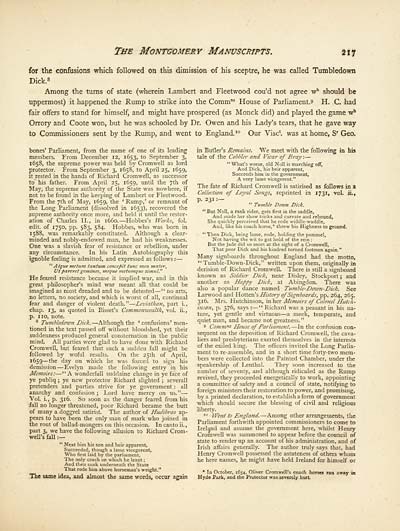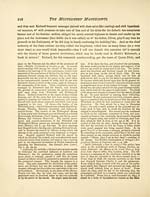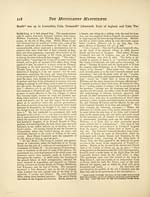Montgomery manuscripts
(231) Page 217
Download files
Complete book:
Individual page:
Thumbnail gallery: Grid view | List view

The Montgomery Manuscripts.
217
for the confusions which followed on this dimission of his sceptre, he was called Tumbledown
Dick. 8
Among the turns of state (wherein Lambert and Fleetwood cou'd not agree w h should be
uppermost) it happened the Rump to strike into the Comm™ House of Parliaments H. C. had
fair offers to stand for himself, and might have prospered (as Monck did) and played the game w*
Orrory and Coote won, but he was schooled by Dr. Owen and his Lady's tears, that he gave way
to Commissioners sent by the Rump, and went to England. 10 Our Vise', was at home, S r Geo.
bones' Parliament, from the name of one of its leading
members. From December 12, 1653, to September 3,
1658, the supreme power was held by Cromwell as lord
protector. From September 3, 1658, to April 25, 1659,
it rested in the hands of Richard Cromwell, as successor
to his father. From April 25, 1659, until the 7th of
May, the supreme authority of the State was nowhere, if
not to be found in the keeping of Lambert or Fleetwood.
From the 7th of May, 1659, the ' Rump,' or remnant of
the Long Parliament (dissolved in 1653), recovered the
supreme authority once more, and held it until the restor-
ation of Charles II., in 1660. — Hobbes's Works, fol.
edit, of 1750, pp. 5S3, 584. Hobbes, who was born in
1588, was remarkably constituted. Although a clear-
minded and nobly-endowed man, he had his weaknesses.
One was a slavish fear of resistance or rebellion, under
any circumstance. In his Latin Autobiography this
ignoble feeling is admitted, and expressed as follows : —
" Atgue metum iantum coticepit tunc men mater,
Ut pareret geminos, meqite mctumquc simul."
He feared resistance because it implied war, and in this
great philosopher's mind war meant all that could be
imagined as most dreaded and to be detested — " no arts,
no letters, no society, and which is worst of all, continual
fear and danger ot violent death." — Leviathan, part i.,
chap. 13, as quoted in Bisset's Commonwealth, vol. ii.,
p. no, note.
8 Tumbledown Dick. — Although the ' confusions' men-
tioned in the text passed off without bloodshed, yet their
suddenness produced general consternation in the public
mind. All parties were glad to have done with Richard
Cromwell, but feared that such a sudden fall might be
followed by woful results. On the 25th of April,
1659 — the day on which he was forced to sign his
demission — Evelyn made the following entry in his
Memoirs: — "A wonderfull suddaine change in ye face of
ye publiq ; ye new protector Richard slighted ; severall
pretenders and parties strive for ye government : all
anarchy and confusion ; Lord have mercy on us." —
Vol. i., p. 316. So soon as the danger feared from his
fall no longer threatened, poor Richard became the butt
of many a doggrel satirist. The author of Hudibras ap-
pears to have been the only man of mark who joined in
the rout of ballad-mongers on this occasion. In canto ii.,
part 3, we have the following allusion to Richard Crom-
well's fall : —
" Next him his son and heir apparent,
Succeeded, though a lame vicegerent,
Who first laid by the parliament,
The only cruch on which he leant ;
And then sunk underneath the State
That rode him above horseman's weight."
The same idea, and almost the same words, occur again
in Butler's Remains. We meet with the following in his
tale of the Cobbler and Vicar of Bray : —
" What's worse, old Noll is marching off.
And Dick, his heir apparent,
Succeeds him in the government,
A very lame vicegerent."
The fate of Richard Cromwell is satirised as follows in 3.
Collection of Loyal Songs, reprinted in 1731, vol. ii.,
p. 231 :—
Tumble Down Dick.
" But Noll, a rank rider, gets first in the saddle,
And made her show tricks and curvate and rebound,
She quickly perceived that he rode widdle-waddle,
And, like his coach horse,* threw his Highness to ground.
" Then Dick, being lame, rode, holding the pummel,
Not having the wit to get hold of the rein ;
But the jade did so snort at the sight of a Cromwell,
That poor Dick and his kindred turned footmen again."
Many signboards throughout England had the motto,
"Tumble-Down-Dick," written upon them, originally in
derision of Richard Cromwell. There is still a signboard
known as Soldier Dick, near Disley, Stockport ; and
another as Happy Dick, at Abingdon. There was
also a popular dance named Tumble-Dcnun-Dick. See
Larwood and Hotten's History of Signboards, pp. 264, 265.
316. Mrs. Hutchinson, in her Memoirs of Colonel Hutch-
inson, p. 376, says : — " Richard was a peasant in his na-
ture, yet gentle and virtuous — a meek, temperate, and
quiet man, and became not greatness."
9 Comm'" House of Parliament. — In the confusion con-
sequent on the deposition of Richard Cromwell, the cava-
liers and presbyterians exerted themselves in the interests
of the exiled king. The officers invited the Long Parlia-
ment to re-assemble, and in a short time forty-two mem-
bers were collected into the Painted Chamber, under the
speakership of Lenthal. They soon increased to the
number of seventy, and although ridiculed as the Rump
revived, they proceeded energetically to work, appointing
a committee of safety and a council of state, notifying to
foreign ministers their restoration to power, and promising,
by a printed declaration, to establish a form of government
which should secure the blessing of civil and religious
liberty.
10 [Vent to England.— Among other arrangements, the
Parliament forthwith appointed commissioners to come to
Ireland and assume the government here, whilst Henry
Cromwell was summoned to appear before the council of
state to render up an account of his administration, and of
Irish affairs generally. The author truly says that, had
Henry Cromwell possessed the astuteness of others whom
he here names, he might have held Ireland for himself or
* In October, 1654, Oliver Cromwell's coach horses ran away in
Hyde Park, and the Protector was severely hurt.
217
for the confusions which followed on this dimission of his sceptre, he was called Tumbledown
Dick. 8
Among the turns of state (wherein Lambert and Fleetwood cou'd not agree w h should be
uppermost) it happened the Rump to strike into the Comm™ House of Parliaments H. C. had
fair offers to stand for himself, and might have prospered (as Monck did) and played the game w*
Orrory and Coote won, but he was schooled by Dr. Owen and his Lady's tears, that he gave way
to Commissioners sent by the Rump, and went to England. 10 Our Vise', was at home, S r Geo.
bones' Parliament, from the name of one of its leading
members. From December 12, 1653, to September 3,
1658, the supreme power was held by Cromwell as lord
protector. From September 3, 1658, to April 25, 1659,
it rested in the hands of Richard Cromwell, as successor
to his father. From April 25, 1659, until the 7th of
May, the supreme authority of the State was nowhere, if
not to be found in the keeping of Lambert or Fleetwood.
From the 7th of May, 1659, the ' Rump,' or remnant of
the Long Parliament (dissolved in 1653), recovered the
supreme authority once more, and held it until the restor-
ation of Charles II., in 1660. — Hobbes's Works, fol.
edit, of 1750, pp. 5S3, 584. Hobbes, who was born in
1588, was remarkably constituted. Although a clear-
minded and nobly-endowed man, he had his weaknesses.
One was a slavish fear of resistance or rebellion, under
any circumstance. In his Latin Autobiography this
ignoble feeling is admitted, and expressed as follows : —
" Atgue metum iantum coticepit tunc men mater,
Ut pareret geminos, meqite mctumquc simul."
He feared resistance because it implied war, and in this
great philosopher's mind war meant all that could be
imagined as most dreaded and to be detested — " no arts,
no letters, no society, and which is worst of all, continual
fear and danger ot violent death." — Leviathan, part i.,
chap. 13, as quoted in Bisset's Commonwealth, vol. ii.,
p. no, note.
8 Tumbledown Dick. — Although the ' confusions' men-
tioned in the text passed off without bloodshed, yet their
suddenness produced general consternation in the public
mind. All parties were glad to have done with Richard
Cromwell, but feared that such a sudden fall might be
followed by woful results. On the 25th of April,
1659 — the day on which he was forced to sign his
demission — Evelyn made the following entry in his
Memoirs: — "A wonderfull suddaine change in ye face of
ye publiq ; ye new protector Richard slighted ; severall
pretenders and parties strive for ye government : all
anarchy and confusion ; Lord have mercy on us." —
Vol. i., p. 316. So soon as the danger feared from his
fall no longer threatened, poor Richard became the butt
of many a doggrel satirist. The author of Hudibras ap-
pears to have been the only man of mark who joined in
the rout of ballad-mongers on this occasion. In canto ii.,
part 3, we have the following allusion to Richard Crom-
well's fall : —
" Next him his son and heir apparent,
Succeeded, though a lame vicegerent,
Who first laid by the parliament,
The only cruch on which he leant ;
And then sunk underneath the State
That rode him above horseman's weight."
The same idea, and almost the same words, occur again
in Butler's Remains. We meet with the following in his
tale of the Cobbler and Vicar of Bray : —
" What's worse, old Noll is marching off.
And Dick, his heir apparent,
Succeeds him in the government,
A very lame vicegerent."
The fate of Richard Cromwell is satirised as follows in 3.
Collection of Loyal Songs, reprinted in 1731, vol. ii.,
p. 231 :—
Tumble Down Dick.
" But Noll, a rank rider, gets first in the saddle,
And made her show tricks and curvate and rebound,
She quickly perceived that he rode widdle-waddle,
And, like his coach horse,* threw his Highness to ground.
" Then Dick, being lame, rode, holding the pummel,
Not having the wit to get hold of the rein ;
But the jade did so snort at the sight of a Cromwell,
That poor Dick and his kindred turned footmen again."
Many signboards throughout England had the motto,
"Tumble-Down-Dick," written upon them, originally in
derision of Richard Cromwell. There is still a signboard
known as Soldier Dick, near Disley, Stockport ; and
another as Happy Dick, at Abingdon. There was
also a popular dance named Tumble-Dcnun-Dick. See
Larwood and Hotten's History of Signboards, pp. 264, 265.
316. Mrs. Hutchinson, in her Memoirs of Colonel Hutch-
inson, p. 376, says : — " Richard was a peasant in his na-
ture, yet gentle and virtuous — a meek, temperate, and
quiet man, and became not greatness."
9 Comm'" House of Parliament. — In the confusion con-
sequent on the deposition of Richard Cromwell, the cava-
liers and presbyterians exerted themselves in the interests
of the exiled king. The officers invited the Long Parlia-
ment to re-assemble, and in a short time forty-two mem-
bers were collected into the Painted Chamber, under the
speakership of Lenthal. They soon increased to the
number of seventy, and although ridiculed as the Rump
revived, they proceeded energetically to work, appointing
a committee of safety and a council of state, notifying to
foreign ministers their restoration to power, and promising,
by a printed declaration, to establish a form of government
which should secure the blessing of civil and religious
liberty.
10 [Vent to England.— Among other arrangements, the
Parliament forthwith appointed commissioners to come to
Ireland and assume the government here, whilst Henry
Cromwell was summoned to appear before the council of
state to render up an account of his administration, and of
Irish affairs generally. The author truly says that, had
Henry Cromwell possessed the astuteness of others whom
he here names, he might have held Ireland for himself or
* In October, 1654, Oliver Cromwell's coach horses ran away in
Hyde Park, and the Protector was severely hurt.
Set display mode to:
![]() Universal Viewer |
Universal Viewer | ![]() Mirador |
Large image | Transcription
Mirador |
Large image | Transcription
Images and transcriptions on this page, including medium image downloads, may be used under the Creative Commons Attribution 4.0 International Licence unless otherwise stated. ![]()
| Histories of Scottish families > Montgomery manuscripts > (231) Page 217 |
|---|
| Permanent URL | https://digital.nls.uk/95235699 |
|---|
| Description | A selection of almost 400 printed items relating to the history of Scottish families, mostly dating from the 19th and early 20th centuries. Includes memoirs, genealogies and clan histories, with a few produced by emigrant families. The earliest family history goes back to AD 916. |
|---|

